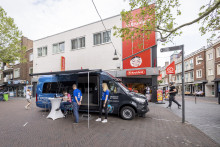`If you don't take a chance, you don't stand a chance'. This was the slogan on the brochures distributed by the Indian community to 75 people last Friday at the Academia-Industry Meet and Panel Discussion event held at the Vrijhof auditorium on September 12.
 |
| Photo: On September 12 panelists discussed creating future spin-offs in India and the Netherlands. Foto: Gijs van Ouwerkerk. |
Companies throughout the world are now leveraging India's vast human resources and consumer markets, and tapping into emerging investment opportunities. The Indian Student Association (ISA) in cooperation with the University of Twente (UT) teamed efforts to host a panel discussion and academia-industry meet. The event provided a rare opportunity for attendees to learn about conducting business in India and the Netherlands. Panelists addressed the issue of Indians, who are unwilling to exchange the safety of academic life for the risks involved with entrepreneurship.
`Taking risks is one of the most important attributes of an entrepreneur and this is something that one is born with,' said Mr. Ram Lakhina, the executive president of the Netherlands India Chamber of Commerce and Trade. He argued that the Netherlands is in need of skilled manpower and an emerging economy like India has the ability to meet this need. He offered the audience a detailed description of the steps involved in starting one's own company and provided various examples of Dutch organizations like SenterNovem and the Netherlands Organization for Applied Scientific Research (TNO), which can help expedite the process for entrepreneurs.
Distinguished speakers, the Rector Magnificus Henk Zijm and the Indian Ambassador to the Netherlands, Ms Neelam Sabharwa traced the long cultural and trade relations between Indian and the Netherlands. She spoke highly of the entrepreneurial support the university offers its students and researchers. In her opinion, highly skilled Indians in the Netherlands, who understand the nuances of Dutch culture, besides possessing first hand knowledge of their own country, are the best candidates for Dutch companies planning to open subsidiaries in India.
`Entrepreneurship, is a choice of 10 to 15 % of UT employees and students in comparison to the Dutch national average of 4 %,' said Dr. Kees Eijkel, director of Kennispark Twente. He suggested that entrepreneurs and academics have a different line of thought, and Kennispark attempts to bridge this gap by joining the two forces together to facilitate a seamless transfer of knowledge. Eijkel was the ideal choice to enlighten the audience about applying scientific knowledge to developing commercial ventures.
Another speaker, Dr. Bob Hoekstra, the director of Opportunity India Consulting is the pioneer of the Indian Business Centre, a greenhouse for ideas to serve rural India by applying technologies and business models. He said India offers the best market for most companies around the world thanks to its huge population and varying needs. `One of our biggest campuses is in India. We have just off-shored our headquarters to Holland,' joked Hoekstra, who was also the former CEO of the Phillips Centre in Bangalore, India. He said the future of Holland lay in the hands of the highly skilled population that is attracted to its shores.
The closing panel discussion stimulated debate about the pitfalls that new entrepreneurs might face when starting a business venture, the government's role to offer financial support, and the ideas needed to close the gap between industry and academia. The panel discussion was then opened to the audience who quizzed panelists on a range of topics.
When asked what roles Indian students could play in boosting the Dutch economy, Mrs. Riva Das Ganguly, minister at the Indian Embassy, informed the audience about the Global Indian Network of Knowledge (GINK), an electronic platform, which enables Indians all over the world to give their opinions and suggestions on various subjects to improve India.
As an advocate of internationalization, Zijm closed the session by expressing his hope that such events can pave the way for more spin-offs by skilled Indians, both in India and the Netherlands.







